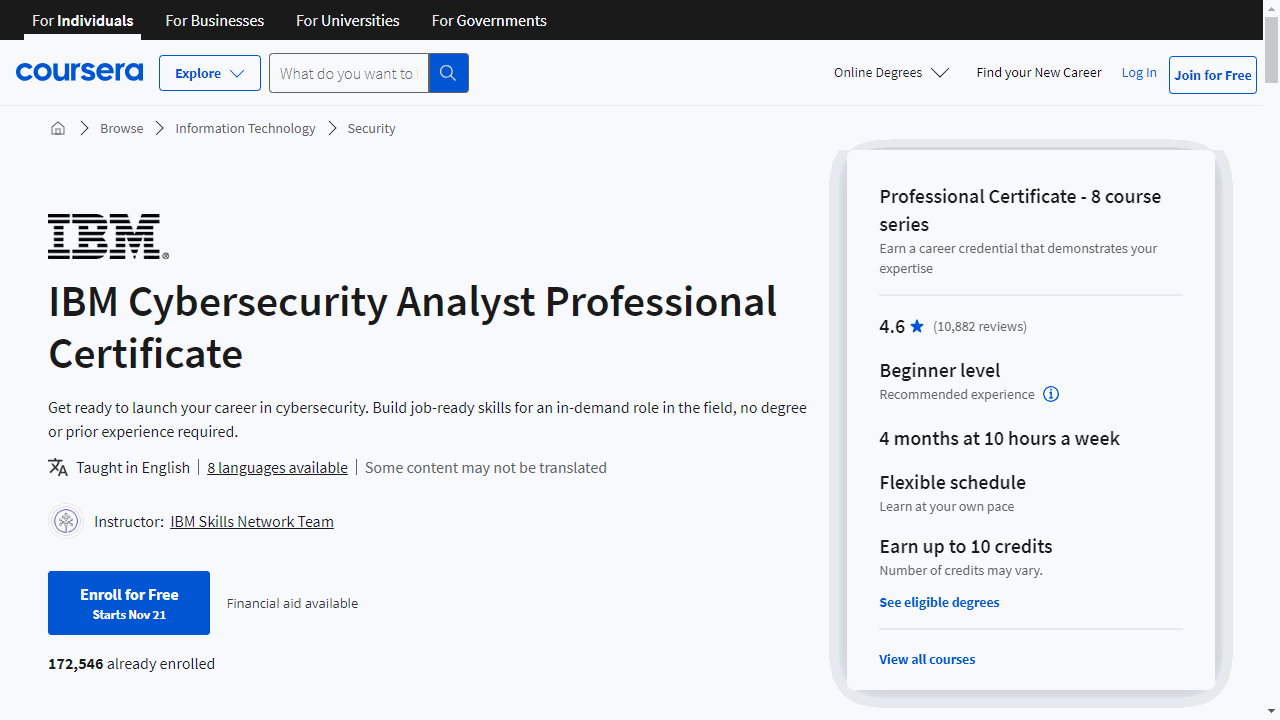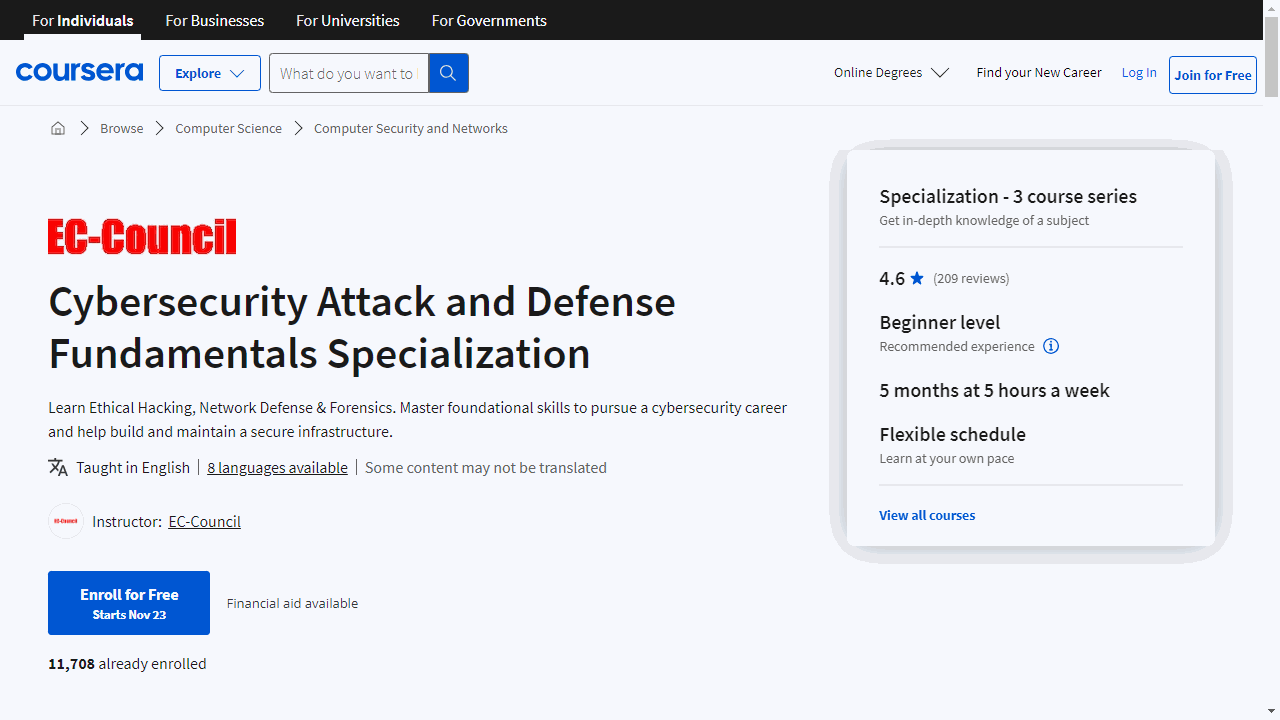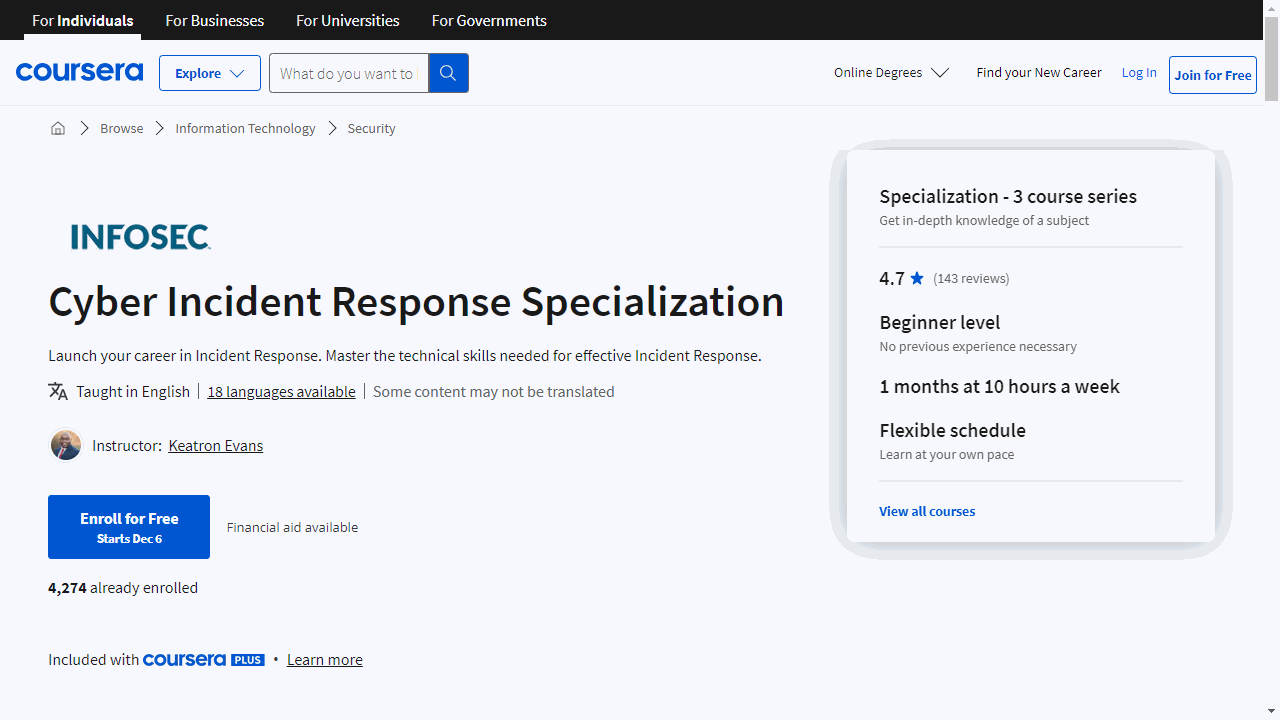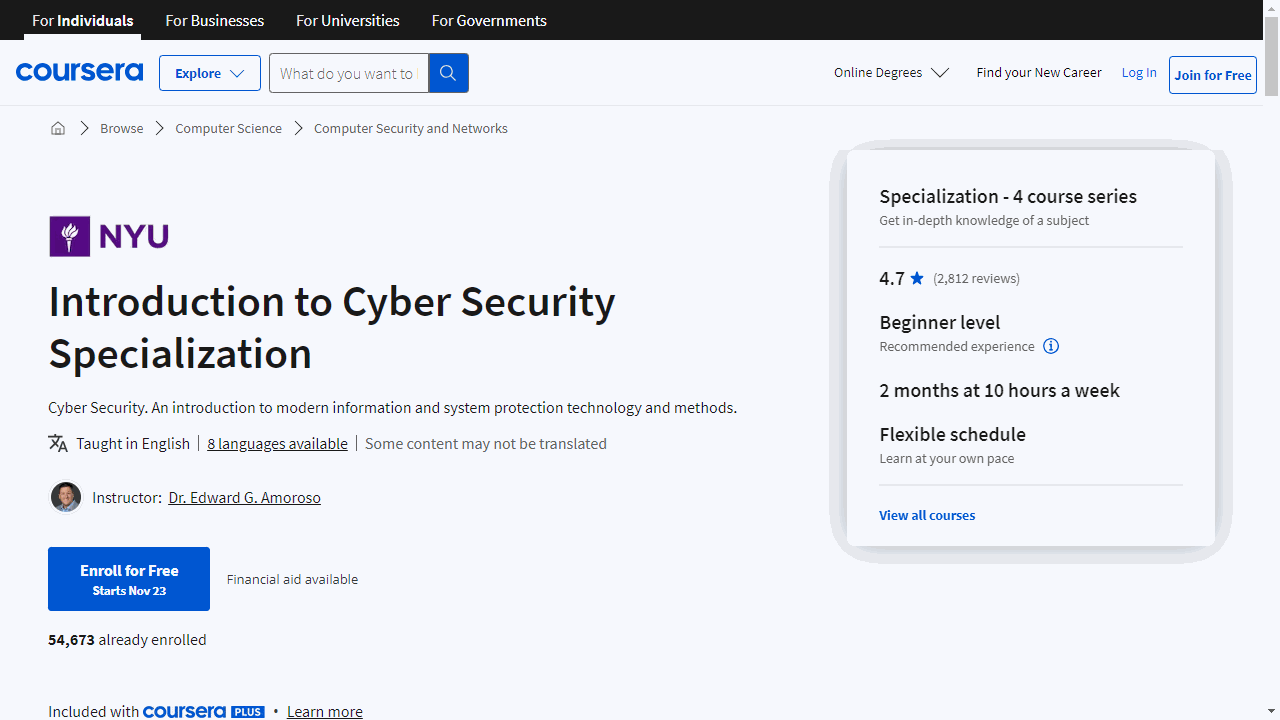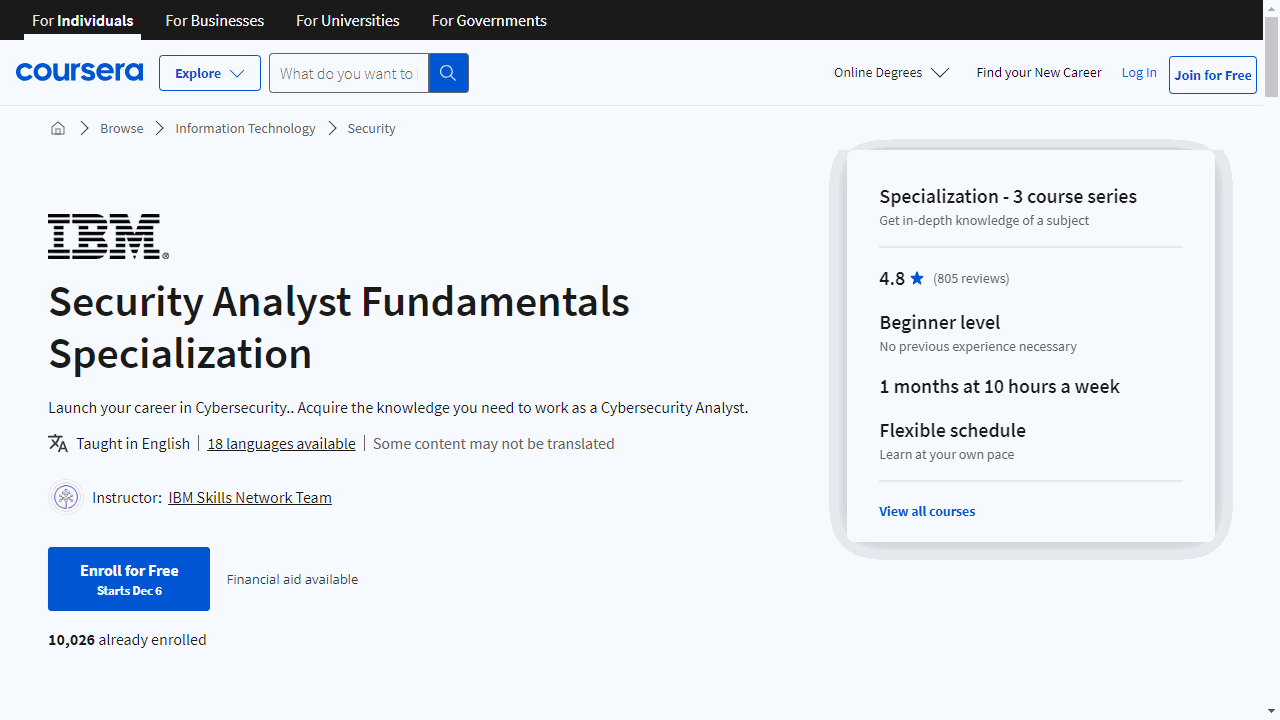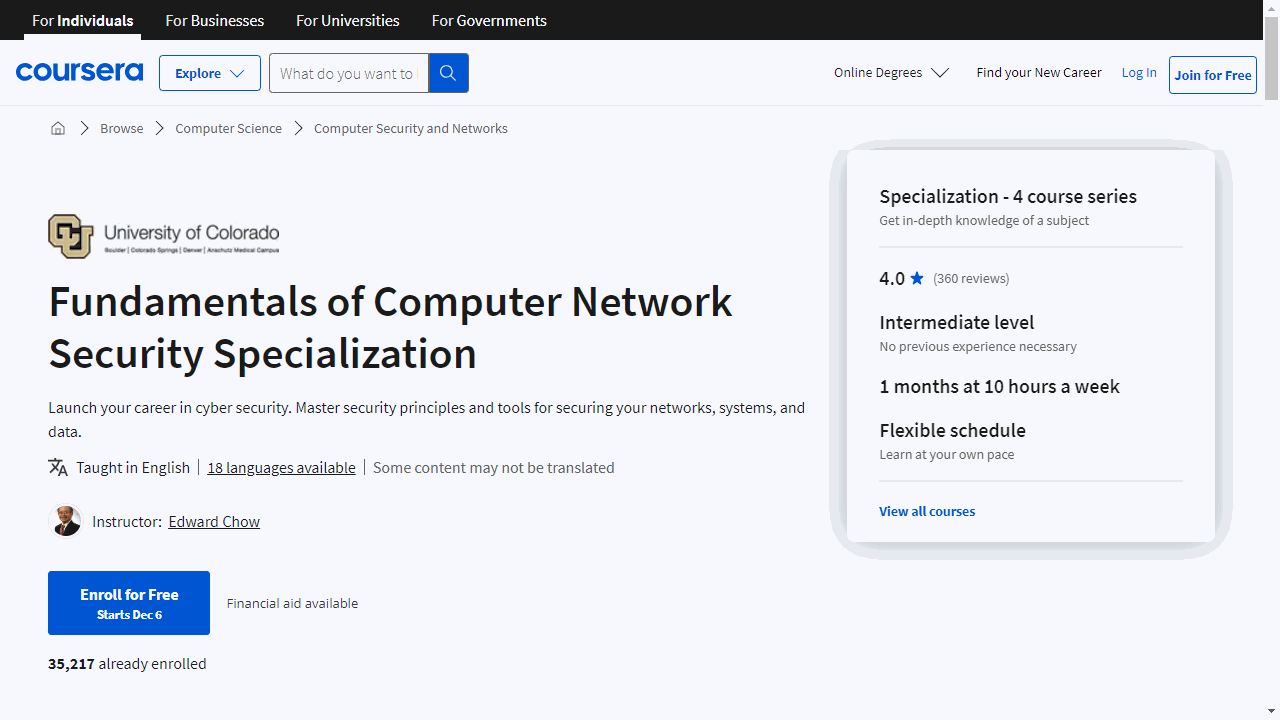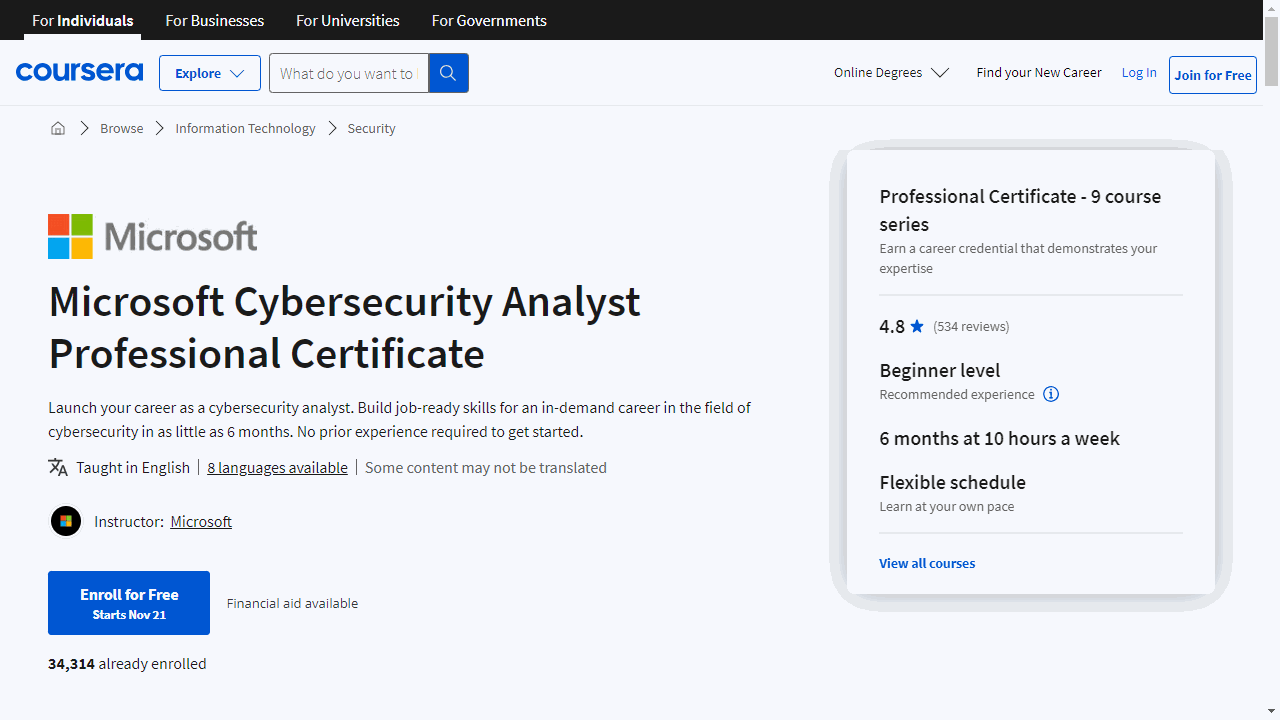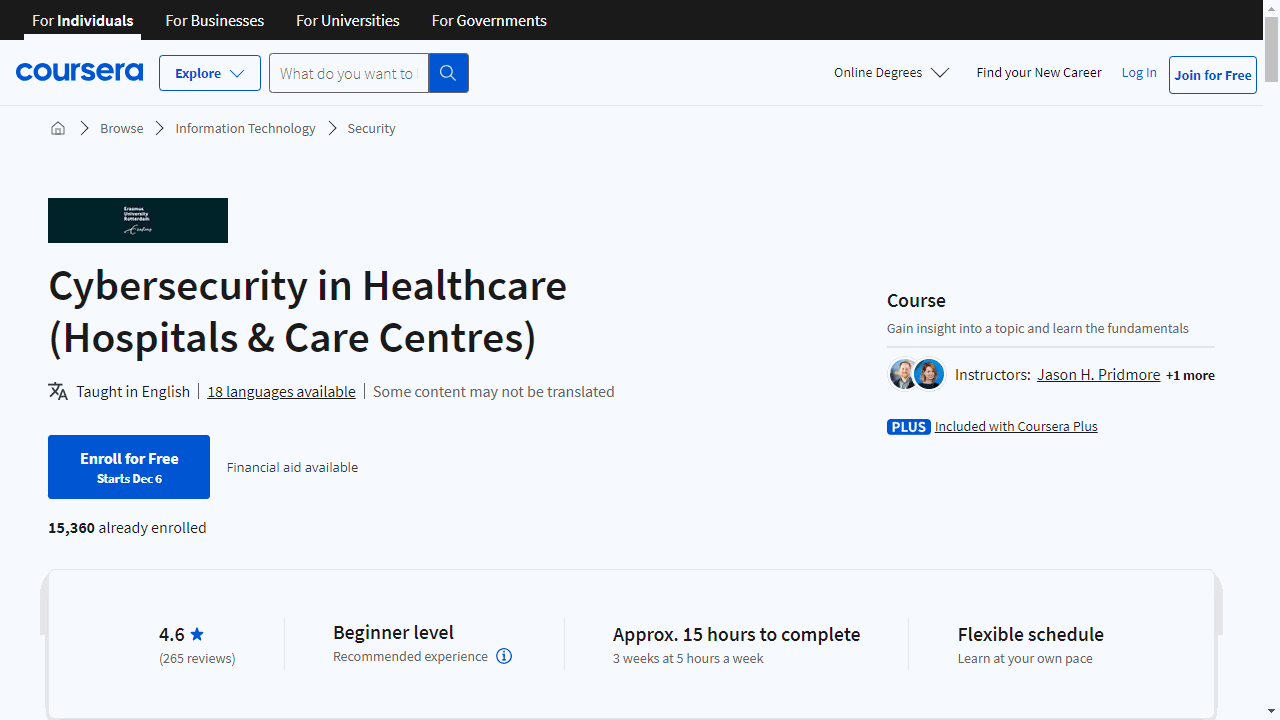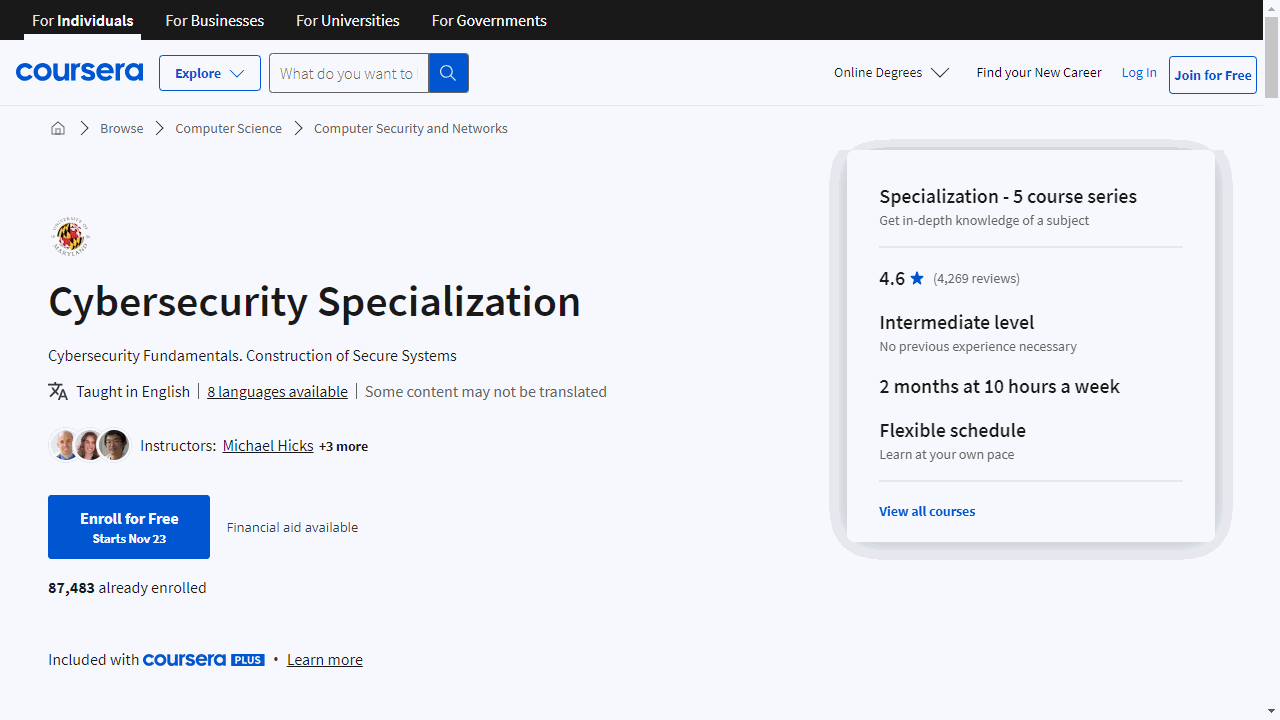Ethical hacking is a fascinating and crucial field that involves understanding how cyberattacks work and using those techniques to test the security of systems in a legal and ethical manner.
Learning ethical hacking can equip you with valuable skills for a career in cybersecurity, allowing you to protect organizations from real-world threats.
Finding the right ethical hacking course can feel overwhelming with so many choices available online.
You want something that teaches you the fundamentals and advanced techniques, but also one that’s engaging and taught by industry professionals.
For the best overall ethical hacking course on Coursera, we recommend IBM Cybersecurity Analyst Professional Certificate.
This comprehensive program covers a wide range of cybersecurity topics, including penetration testing, incident response, and forensics.
The course is designed by industry experts and includes hands-on labs and real-world case studies, ensuring you gain practical skills and apply your knowledge to real-world situations.
This is just one of many excellent options, though.
Keep reading for more recommendations for beginners and advanced learners, as well as courses focusing on specific areas of ethical hacking like network security or web application security.
IBM Cybersecurity Analyst Professional Certificate
Begin with “Introduction to Cybersecurity Tools & Cyber Attacks,” where you’ll grasp the evolution of cyber threats and familiarize yourself with fundamental security concepts and tools.
This course lays the groundwork for understanding the complexities of protecting digital assets.
Progress to “Cybersecurity Roles, Processes & Operating System Security,” which delves into the human aspect of cybersecurity.
You’ll explore various roles and their responsibilities, and gain practical knowledge of operating system commands.
Understanding virtualization’s impact on security is another key takeaway.
The “Cybersecurity Compliance Framework & System Administration” course is pivotal for those looking to navigate the maze of industry standards and compliance requirements.
It also covers the nuts and bolts of user and server administration, emphasizing the importance of endpoint security and the intricacies of cryptography.
Network security is the focus of the “Network Security & Database Vulnerabilities” course.
Here, you’ll dive into the technicalities of network infrastructure and learn how to identify and mitigate database vulnerabilities—a critical skill for safeguarding an organization’s data.
“Penetration Testing, Incident Response and Forensics” offers a hands-on approach to proactive security measures and reactive strategies.
You’ll explore the tools and techniques for penetration testing, learn to craft effective incident response plans, and understand the meticulous process of digital forensics.
In “Cyber Threat Intelligence,” the curriculum shifts to defensive strategies and the importance of threat intelligence.
You’ll learn to use tools for network monitoring and data protection, ensuring you’re well-versed in the latest defensive tactics.
The program culminates with the “Cybersecurity Capstone: Breach Response Case Studies,” where you apply your cumulative knowledge to real-world scenarios.
This practical exercise simulates the decision-making process in the aftermath of a cyber breach, preparing you for real-life challenges.
Completing the series with the “IBM Cybersecurity Analyst Assessment” solidifies your understanding and earns you the IBM Cybersecurity Analyst Professional Certificate, a testament to your readiness for a role in the field.
Cybersecurity Attack and Defense Fundamentals Specialization
Starting with “Ethical Hacking Essentials” (EHE), you’ll delve into the core of ethical hacking, learning to identify and address security vulnerabilities.
This course covers everything from password cracking to cloud computing, with practical labs to solidify your understanding.
Achieving EHE certification not only boosts your skillset but also enhances your resume, signaling to employers your readiness for the field.
Moving on to “Network Defense Essentials” (NDE), you’ll focus on safeguarding information systems.
This course emphasizes the importance of network security, from encryption to access control, and includes interactive labs for hands-on learning.
With an NDE certification, you demonstrate a comprehensive grasp of network defense strategies, making you an asset to any cybersecurity team.
Lastly, “Digital Forensics Essentials” (DFE) immerses you in the investigative side of cybersecurity.
You’ll explore techniques for uncovering and analyzing digital evidence, tackling topics like dark web forensics and malware analysis.
The DFE certification is proof of your ability to navigate complex digital investigations, a skill highly valued in the cybersecurity industry.
Cyber Incident Response Specialization
This set of courses by Infosec equips you with the skills to effectively respond to cyber threats.
In the “Cyber Incident Response” course, you’ll start with the basics of incident management and quickly move into practical exercises.
You’ll gain expertise in computer security incident management, delve into malware analysis, and practice memory forensics.
Traffic analysis skills are also covered, teaching you to trace the source and impact of cyber incidents.
The “Stages of Incident Response” course breaks down the incident response process into clear, manageable phases.
You’ll learn about the critical functions of incident response, including verification and validation techniques, and get familiar with concepts like Ordered Pair and REST.
These skills are crucial for a comprehensive understanding of incident response workflows.
Finally, “Technical Deep Dive with Incident Response Tools” provides hands-on experience with the tools of the trade.
You’ll explore DNS intricacies, enhance your knowledge of image resolution, and learn how to address security breaches.
The course also introduces you to packet analyzers, essential for monitoring and interpreting network traffic.
Introduction to Cyber Security Specialization
Offered by NYU.
The journey begins with “Introduction to Cyber Attacks,” where you’ll gain a foundational understanding of common cyber threats.
This course demystifies complex concepts, from Unix kernel hacks to Internet worms, and teaches you to apply the CIA (confidentiality, integrity, availability) framework to real-world scenarios.
You’ll also learn to conduct basic cyber security risk analysis, prioritizing threats to safeguard assets effectively.
In “Cyber Attack Countermeasures,” the focus shifts to defense.
You’ll explore foundational models like Bell-LaPadula and delve into authentication protocols, including RSA SecureID and Kerberos.
The course simplifies cryptography, breaking down block ciphers and public-key systems, and introduces SSL schemes that underpin secure online transactions.
“Real-Time Cyber Threat Detection and Mitigation” sharpens your skills in network security.
You’ll understand TCP/IP protocol vulnerabilities and configure firewalls to thwart intrusions.
The course also addresses advanced persistent threats (APTs), offering strategies to protect enterprise environments from sophisticated attacks.
Finally, “Enterprise and Infrastructure Security” broadens your perspective with advanced topics relevant to modern enterprises.
You’ll navigate compliance frameworks such as NIST and PCI, understand the security implications of emerging technologies like blockchain and IoT, and learn about mobile and cloud security strategies.
This course also provides career planning advice, helping you stay competitive in the cybersecurity field.
Security Analyst Fundamentals Specialization
This specialization from IBM builds your cybersecurity expertise from the ground up.
In the “Penetration Testing, Incident Response and Forensics” course, you’ll learn to conduct penetration tests, manage cyber incidents, and delve into digital forensics.
You’ll understand how to gather critical data, utilize testing tools, and the significance of scripting in cybersecurity.
Completing this course qualifies you for an IBM digital badge, showcasing your penetration testing skills.
Moving on to “Cyber Threat Intelligence,” you’ll focus on defensive strategies to protect networks.
You’ll gain insights into network access control, data protection, and endpoint security.
The course also covers vulnerability scanning and application security, providing hands-on experience with essential cybersecurity tools.
Upon completion, you’ll be eligible for another IBM digital badge, affirming your knowledge in threat intelligence.
Lastly, the “Cybersecurity Capstone: Breach Response Case Studies” course allows you to apply what you’ve learned by analyzing real-world cyber breaches.
You’ll explore various attack types, their impact on organizations, and the cost of data breaches.
This project-based learning culminates in a peer-reviewed case study, and successful completion earns you a final IBM digital badge.
Fundamentals of Computer Network Security Specialization
This specialization is offered by University of Colorado System.
In “Design and Analyze Secure Networked Systems,” you’ll tackle cybersecurity fundamentals, pinpoint network vulnerabilities, and apply the CIA security model to real-world breaches.
You’ll master risk management frameworks and security design principles.
Hands-on experience comes with using GnuPG on Amazon Cloud for cryptographic tasks, ensuring you know how to safeguard data and computer systems.
“Basic Cryptography and Programming with Crypto API” immerses you in cryptography.
You’ll decrypt messages, explore symmetric key cryptography, and delve into DES and AES standards.
Practical skills are honed with OpenSSL and PHP Crypto API, enabling you to craft secure programs for data encryption and decryption—key for secure communication.
“Hacking and Patching” shifts your focus to offensive security.
You’ll learn to exploit web apps with SQL injection, manage Trojans, and implement patches using input validation.
Tools like Nessus, Kali Linux, and Metasploit Framework will be your toolkit for vulnerability scanning and penetration testing.
This course equips you with the skills to think like a hacker and develop robust defenses.
Lastly, “Secure Networked System with Firewall and IDS” empowers you to protect networks.
You’ll construct a dual-firewall DMZ, define security policies, and dive deep into Linux firewalls and Snort IDS.
This course is essential if you aim to maintain the integrity of networked systems.
Each course is designed to provide practical, hands-on experience, preparing you to apply your knowledge in real-world scenarios.
Microsoft Cybersecurity Analyst Professional Certificate
Begin with “Introduction to Computers and Operating Systems and Security,” where you’ll build a strong foundation.
You’ll learn to identify computer components, understand their interaction with operating systems, and get a primer on the cybersecurity landscape.
This course isn’t just informative; it’s a practical step towards the Microsoft SC-900 exam and the subsequent certification.
Moving on, “Introduction to Networking and Cloud Computing” expands your expertise into the realms of network infrastructure and cloud services.
You’ll learn to set up, monitor, and secure networks, as well as navigate cloud computing environments.
This knowledge is crucial for today’s tech-driven workplaces and also preps you for the SC-900 exam.
With cyber threats constantly evolving, “Cybersecurity Threat Vectors and Mitigation” equips you to identify and counteract them.
You’ll delve into encryption techniques and compliance concepts, becoming well-versed in the strategies to safeguard digital assets.
Authentication and authorization are at the heart of cybersecurity, and “Cybersecurity Identity and Access Solutions using Azure AD” covers these topics thoroughly.
You’ll explore Azure Active Directory and its role in managing enterprise security, preparing you to implement robust access management policies.
In “Cybersecurity Solutions and Microsoft Defender,” you’ll learn to deploy cloud security policies and utilize tools like Microsoft Defender to protect against sophisticated threats.
This course emphasizes practical skills for defending Azure resources and understanding security standards.
“Cybersecurity Tools and Technologies” introduces you to the hands-on aspect of cybersecurity.
You’ll practice penetration testing and learn to interpret security scans, gaining skills that are directly applicable to securing cloud platforms.
If you are interested in the strategic side of cybersecurity, “Cybersecurity Management and Compliance” offers insights into data and record management, policy formation, and regulatory compliance.
You’ll also learn about Microsoft’s privacy principles and compliance management tools.
The program culminates with “Advanced Cybersecurity Concepts and Capstone Project,” where you apply your cumulative knowledge to threat modeling, secure development, and IoT security.
The capstone project is a chance to demonstrate your skills in a comprehensive security mitigation strategy plan.
To ensure you’re exam-ready, “Microsoft SC-900 Exam Preparation and Practice” provides a series of practice exams and study strategies.
This course is designed to boost your confidence and help you achieve certification.
Each course in this certificate program is crafted to be accessible, with no prior degree or experience required.
The learning is self-paced, allowing you to fit it into your schedule.
Cybersecurity in Healthcare (Hospitals & Care Centres)
This course offered by Erasmus University Rotterdam zeroes in on the unique cybersecurity challenges healthcare professionals face.
You’ll start with the basics of cybersecurity, understanding the types of sensitive data in healthcare and the digital technologies at play.
Recognizing the threats is crucial, and you’ll delve into real-world incidents, like the cybersecurity breach at Boston Children’s Hospital, to learn from past vulnerabilities.
The course also tackles the human element.
You’ll explore social engineering, where hackers manipulate individuals to gain access to restricted information, and test your skills with a phishing quiz to see if you can identify security threats.
Moving on, you’ll learn about hacking, malware, and study significant cases such as the WannaCry ransomware attack.
This isn’t just theory; you’ll examine the impact of these attacks on healthcare systems and discuss response strategies.
Cyber hygiene is next on the agenda.
You’ll cover essential practices like secure digital communication, device management, and password protocols.
Encryption and the significance of regular software updates are also highlighted, ensuring you understand how to maintain a secure digital environment.
The course culminates with a focus on security culture, emphasizing the importance of integrating cybersecurity into daily healthcare operations.
You’ll discuss GDPR compliance for patient data protection and examine how to foster a robust cybersecurity culture within your workplace.
Throughout the course, interactive elements like writing assignments and peer reviews will engage you, ensuring that your learning is active and applied.
Cybersecurity Specialization
This specialization from the University of Maryland kicks off with “Usable Security,” where you’ll master the art of crafting secure systems that are intuitive for users.
It’s about striking a balance between robust security protocols and user-friendly interfaces.
Moving on to “Software Security,” this course sharpens your skills in identifying and patching software vulnerabilities.
You’ll delve into common security breaches like buffer overflows and SQL injections and learn to implement defenses.
This course is particularly beneficial if you have a background in programming languages such as C/C++ or Java.
The “Cryptography” course demystifies the complex world of securing information through encryption.
It’s a deep dive into the mechanisms that protect data from unauthorized access, ensuring that sensitive information remains confidential.
In “Hardware Security,” the focus shifts to the physical components of technology.
You’ll explore how to safeguard hardware from tampering and cyber threats, understanding that a system’s security is only as strong as its weakest link.
The “Cybersecurity Capstone Project” is the culmination of your learning journey.
Here, you’ll apply your acquired knowledge by developing and testing secure software, engaging in a real-world scenario that tests your defensive and offensive cybersecurity abilities.
